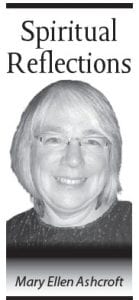Stories guide our way of being; they allow us to make sense of our place in the world. Sometimes our narratives seem clear, but often they are invisible to us. The dominant story I grew up with—about a prince swooping in to rescue me—ran so deep, I was oblivious to its influence until it began to break down.
Some of our controlling narratives are personal—like my handsome prince. Some are sub-cultural, some cultural. The cultural ones only become truly apparent when you move to another country and realize you’re functioning out of a very different narrative. “Why is this place so inefficient? Why is the service so bad?” we think when we travel, since as Americans we know how things “ought” to be.
Our subcultural narratives may be most obvious when we tune to a radio or TV station from the “other side”—“Don’t they understand what’s really happening to this country?” or “How paranoid can you be?” we think.
We need narrative to place ourselves in the world, but we may only become aware of our narratives when they are challenged. This happens when new material is presented—by living overseas, or by getting to know someone you had considered to be “the enemy” and realizing they’re not, or by discovering an uncomfortable truth about a parent or partner, for example. We then have to stretch our story to hold the new evidence. But eventually the story cannot stretch enough and needs to be replaced with a story that welcomes the new and offers hope.
For many years my dominant narrative was one of being a good wife with a good husband and good children living happily ever after. “The family that prays together stays together,” I’d learned. When my “happy family” story broke down, so did my sense of God. By my old story’s standards, the world no longer made sense, and God was at fault for my sad loss.
I had to retell my story, holding fast to core beliefs in God’s faithfulness, and the importance of committed relationships— while letting go of the simplistic, “If I am a good girl, God will bless me and my marriage and family.”
Retelling my narrative was the most painful and difficult work I’ve ever had to do. I had to incorporate new evidence about my husband and God. I had to rework memories so they made sense, before I could move into a future.
I see now how fragile my first story was. God was—in this story—one who benevolently scattered blessings on upstanding, intact families. This is a false story—inadequate for life’s realities, but also false to the Christian faith to which I am committed. I needed to move into a truer story, one in which God’s faithfulness cannot be reduced to what happens in our lives, one in which I play an active rather than a passive role.
Looking at our lives through the lens of narrative—called “narrative theory”—is also helpful when we read the complex collection of books we call the Bible. For example, much of the Old Testament, including the Torah (the Pentateuch) was collected and edited during the Babylonian Exile. Here were folks whose narrative had seemed simple—we are God’s chosen people, delivered from slavery in Egypt, given the Promised Land. But now their story has broken down— here we are slaves again, far from the Promised Land. How can we retell the story in ways that hold old truths while weaving in meaning from present disaster? What can we tell our children about ourselves as God’s chosen and about God’s promises?
The New Testament can also be seen as a grappling to retell the story. Here are good Jews expecting a Messiah to deliver them from oppressive Roman rule. But now…the Messiah comes, but he’s not as war-like as they’d hoped. And then he’s dead! And now he’s alive! The gospels and Paul’s letters are a record of the struggle to tell the old story in the light of these new realities, as they wrestle to understand who they are, who God is, and what to hold onto in this new actuality.
Reading scripture as narrative involves stepping back, contextualizing, and asking big questions. It demands that we not pull a verse out of context here and there, to support whatever story we’re hoping to back up. It involves a growing up, like my setting aside the prince charming dream or the magical God theory.
Moving from an old story (or an old way of reading scripture) is hard work. In the trauma when a story breaks down, we feel disoriented, as if we’re living in a house of mirrors. We need help to walk through these times—a counselor, spiritual director, a support group, a loving faith community. Trustworthy support is crucial because our society offers us unhealthy dominant narratives, like “Living well is the best revenge” or “To thine own self be true” or “You can’t be too rich or too skinny.” We need support, truth-tellers, companions on the way.
From my vantage point now, I am grateful for the fact that I was ejected from my false story, although it is not something I would ever have chosen. I am thankful, too, for support along the way from friends, spiritual directors, counselors, and a faith community. And I’m eternally grateful for the big story in scripture of a God whose faithfulness is constant, but who is always making all things new.
Each month a member of the Cook County Ministerium will offer Spiritual Reflections. This month’s contributor is Mary Ellen Ashcroft, Vicar of Spirit of the Wilderness Episcopal Church.



Loading Comments